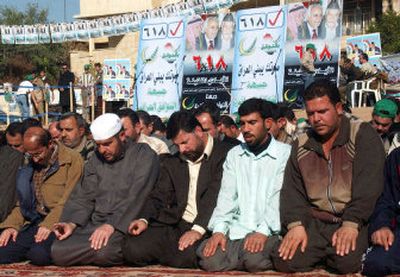Sunnis change attitude about voting in election

BAGHDAD, Iraq – Sunni Arab clerics urged their followers Friday to vote in next week’s national elections – a major shift that the Americans hope will lure the community away from the insurgency.
In the last major weekly service before the voting, the Sunni preacher Ali al-Zandi told worshippers at Umm al-Qura mosque that the Dec. 15 vote would be “a decisive battle that will determine our future.”
“If you give your vote to the wrong people, then the (United States) occupation will continue and the country would be lost,” he said, adding the failure to participate would “pave the way for the evil people to take over.”
Sunni leaders have offered similar advice elsewhere in Iraq, in contrast to the leadup to last January’s nationwide balloting, when the Sunni clerical leadership had urged the community to boycott the vote. The boycott backfired by enabling the rival Shiites and Kurds to seize most of the 275 parliament seats, marginalizing the Sunni Arabs and worsening sectarian tensions. Sunni Arabs form the backbone of the insurgency.
The Association of Muslim Scholars, a Sunni clerical group with links to some Sunni insurgents, stopped short of urging people to vote but said it was up to individual Sunnis to decide whether to participate in the election.
Still, that represented a major shift for the Sunni community, which dominated political life under Saddam Hussein but feels threatened by Shiite domination. This time, many Sunni Arabs are expected to vote, despite warnings from extremists such as al-Qaida in Iraq.
Sunni leaders hope that a big turnout will give their community enough political clout to push through changes in the new constitution, including provisions for a federal state, and to pressure the United States to accept a timetable for the departure of foreign forces.
Sunni candidates say they also want improvements in the security situation, which they blame not only on fellow Sunni insurgents but also on the heavy-handed tactics of the Shiite-dominated security forces.
Changes in the election law all but guarantee that Sunni parties will win more than the 17 seats they hold in the current parliament. In a country where religion and ethnicity define political loyalties, a big Sunni turnout would maximize their strength.